How do you know what to build?
My startup is not very big, nor does it have many resources. We want to prove that our product has a market, and that the market wants it. If we over-invest in features that might be scrapped, we risk eating into resources that should be focused on bringing in revenue or funding.
So what is going to make your startup a success? You need a product that brings genuine value. You need customers. And you need these things before you run out of money.
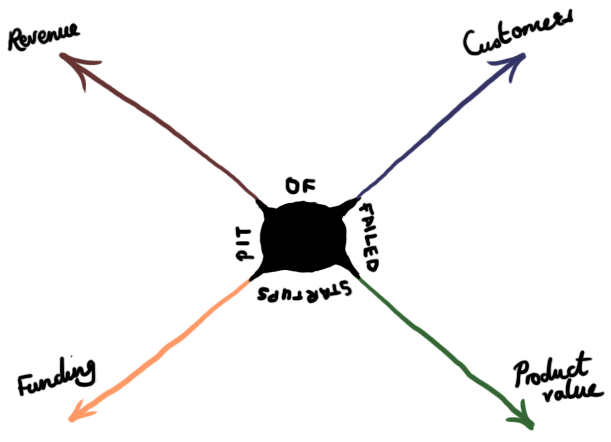
It’s so easy to see how essential every little decision is in a startup. How are these decisions happening? Whether someone simply takes authority or you collaborate, trying to make all of those necessary value judgements can be difficult if people don’t thoroughly know the product.
The beating heart of a startup
The best companies I’ve worked for have a through-and-through sharing mentality. Problems are open for everyone to solve and people listen to each other. The beating heart behind this is often the testing iterations wrapped around product development.
- Someone has a great feature idea, everyone agrees to learn more about it
- Developers implement the feature in a minimal way and share the result
- Testers, or people interested in the feature, jump onto it to learn how it works and if it brought any value. They capture their learnings
- Learnings are shared openly for the whole company to see
- The team discusses the learnings, thinking about what they mean and what’s next
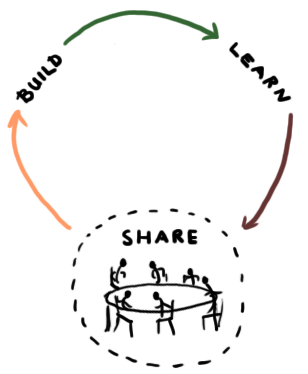
This testing mentality can apply to almost anything and be embraced by everyone. The willingness to be open spreads trust, engages the team and shares responsibility. It’s also a breeding ground for a common language around your company and its product. This lets you focus on expressing yourself with people who understand you rather than constantly clarifying minutiae.
- “Hey, I’ve just written this post for our blog, what do you think?”
- “Our investors think now is a good time to issue an IPO. What do you think?”
- “Here’s an initial product roadmap. What do you think?”
The first step is an invitation, to engage in the company; to be a valued employee. What’s even more inspiring is if the sharer follows up:
- “I got lots of feedback on the blog post, here’s a summary… I’ve incorporated it – what do you think now?”
Share this with your friends…
I feel confident typing this and saying “The more you share and discuss learnings at your company, the better your product will get, the better your decisions will get, and the more exciting your work-life will be.” Why? Because that’s exactly what happens at our startup, Qeek. It feels like our decisions just get better and better.
For instance Simon, my Co-founder, shared these learnings recently:
- This is awesome! I love it! I’m so impressed with your implementation 🙂
- I was unable to recreate the issue: Scenario seems not to animate correctly when hovering over other lanes
- Could we implement the same fade effect as on the new design? I think it would work well.
The last point just illustrates how deploy after deploy, the opportunity is there to tweak, streamline, adapt and optimise. If you take advantage of it the gain is compounded, particularly when those decisions target a clear goal. Our goal is to answer the question “does our product bring genuine value?” and it feels like we are making a beeline for the answer.
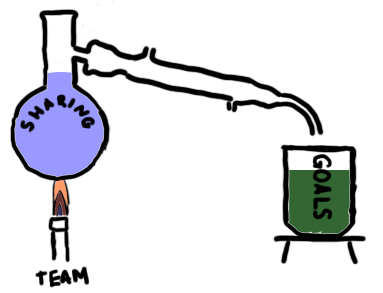
Who do you want to know the most about your product anyway? Consider that without testing, your users’ expertise with your product almost certainly dwarfs your own. Without testing, your best bet might be to ask your customers for a product roadmap and hope for the best.
My Co-founder had some thoughts on this subject:
- “There are many things I like about testing in a startup, but there’s one that stands out. The sense of feeling an unbelievable connection with the product. Of course I’m defining the product with Rajit, but I’m not the person who is writing lines of code. Without testing I can imagine using the product and it not feeling like what I had in mind and indeed specified. That disconnect would easily lead to frustration.”
Testing as learning
Science is the art of learning about the world around you, rigorously, deliberately and in a way that allows others to build upon your work. In science, we have: the hypothesis, the experiment, the observations and the conclusion. In testing, we have the context, the session, the learnings and the go/no-go decision.
Testing is learning. It’s deliberate engagement with a product, in a context. Learnings are carefully captured; surprising, mundane or otherwise.
So imagine that your company has a team dedicated to learning. A team of learners. Their job is to learn the product, to become experts in the product. Their job is to capture what interesting information they can and to make it accessible to everyone in the company. They arrange meetings with the most interested parties to talk through learnings, brainstorm features and decide next steps.
Now what if your whole company were learners? What if the mindset of the company revolved around building, learning and becoming experts in its core product?
A startup that can establish testing as a mindset will see it spill into other parts of the company:
- A/B tests optimising a call-to-action
- The bullseye framework establishing your next traction channel
- Satisfaction/opinion surveys for staff
No company should only live with its head in the clouds, and testing is about aligning yourself with reality. I can tell you a little story about that.
At one company I worked for, we had a spreadsheet with what to focus on next, and what return we could expect. It was a non-commercial advertising site and one item listed something like “reply by SMS”. It was next because the return was attractive. What happened afterwards was your classic case of over-designing. Mockups were made, refined, more and more features crept in, and then the whole thing was going to take more than a month to implement.

When this whole ordeal was finally over, what do you think the return was? The estimate was way off! Not only did people not use it, the team was so committed to the estimate being correct there was no time even to optimise it!
When I think of experiences like that, I think testing isn’t just a “nice-to-have”. Testing is about running a successful business.
A real-world example
At Qeek, our whole development process revolves around learnings. Every time a Heroku deploy message appears in our #release channel on Slack, I get a message “I’m on it!”. That’s Simon, my Co-founder, jumping on our QA environment to check out the latest goods.
Simon gives himself a small timebox to:
- Identify what’s changed
- Get a feel for the new features
- Explore the product
He’ll capture his learnings in Qeek (one of the great features of our product!) and I’ll see a Slack notification. This quickly leads to me checking them out, and then talking them over with Simon. We’re distributed across Europe so a lot of our discussions take place over Slack. Our best discussions, though, are over FaceTime or Google Hangouts.
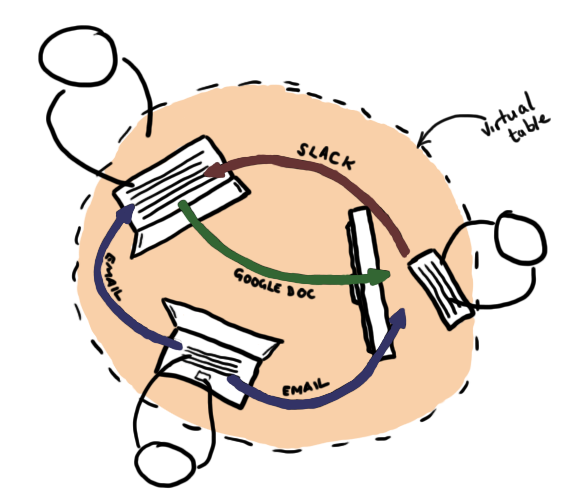
The topic of our talks will naturally be “Simon’s latest learnings” but we’re completely open for it to go in all kinds of directions. To keep the discussion on track, any tangents need to be captured so that we can move on.
You should test at your startup
If there’s one thing you’ve got by reading this article, I hope it’s that testing is more than just trying to break a product. Even better if I’ve managed to convince you that the precious resources of your startup should also be applied to testing.
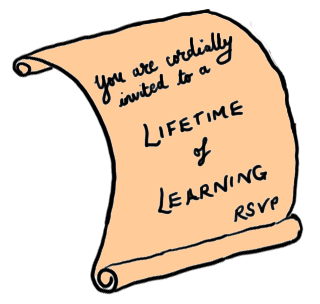
Simon and I are still learning about all of this whilst working on Qeek and we’d love to hear about your own experiences. How normal is it to share at your company? Does the whole team get involved in testing? Is the roadmap discussed, or has it been finalised before you see it or before you hand it over?
We’re having a great time learning and sharing and we aspire to keep it at the heart of everything we do.
